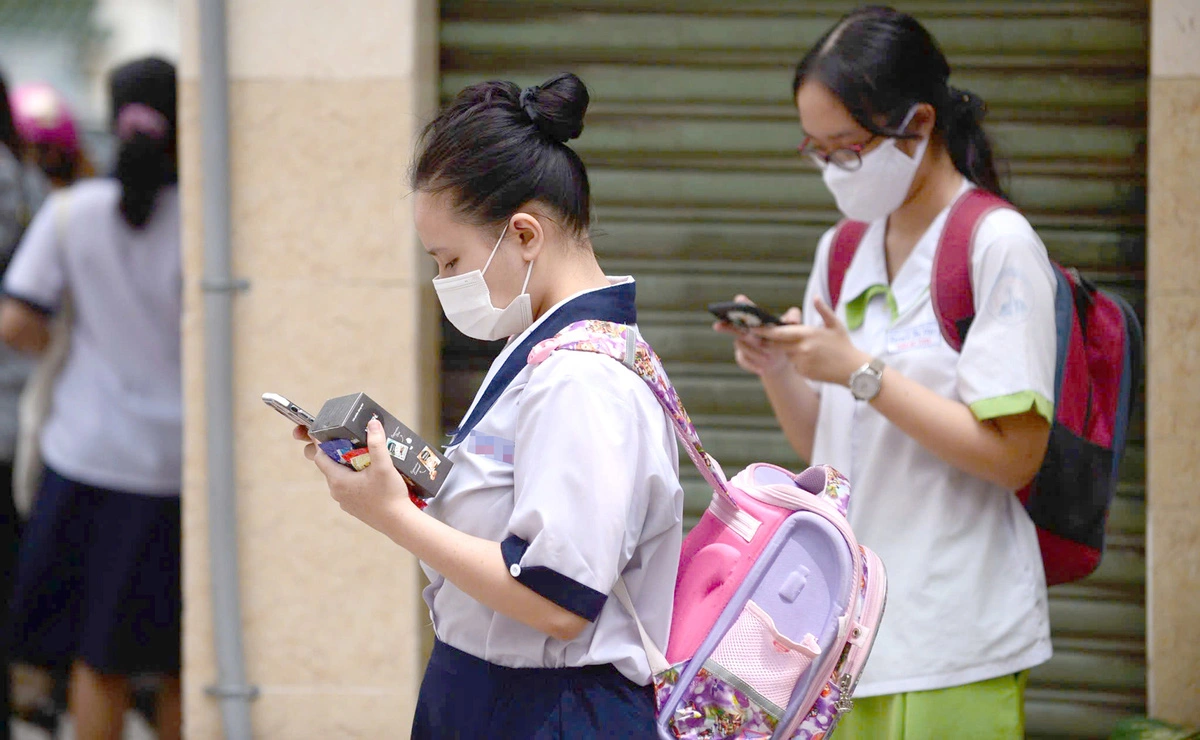(CPV) – The regulation restricting the use of mobile phones in the classroom is attracting the attention of many parents, students and schools. This regulation is expected to create a more serious learning environment, helping students focus on their studies, while minimizing the negative impacts of social networks.
 |
| The Hanoi Departmentof Education and Training has issued a document requiring schools to strictly implement regulations on the use of mobile phones. Photo: tuoitre.vn |
Encourage real communication and connection
The Hanoi Department of Education and Training has issued a document requiring schools to strictly implement regulations on the use of mobile phones and broadcasting devices in schools. Accordingly, students are not allowed to use phones during class.
Many schools have implemented measures to manage students' cell phones since the beginning of the school year. According to feedback from some schools, most students have strictly complied with this regulation. In the new school week, schools continue to emphasize and implement regulations on managing phones during class.
Schools use different approaches. Some elementary schools require parents to ban students from bringing phones to school, while middle and high schools often allow students to bring phones under supervision. Some schools require students to turn off their phones when they enter the school or hand them in to teachers before class, while others allow students to use their phones after class.
Nguyen Ha Linh, a student at Nguyen Du High School, said that not using her phone helped her focus more on her lectures and actively participate in learning activities. This is typical of many students who find that taking a break from their mobile phones can help improve their learning experience.
Not using phones during class helps students focus more on the lesson, thereby improving learning performance. When not distracted by notifications or social networks, students can absorb knowledge more easily.
Without phones, students tend to communicate more with each other, creating connections in the classroom. Nguyen Hong Anh, a student at Dong Da Secondary School, also said that not using phones has helped classmates become happier and more united in common activities.
Limiting phone use also helps reduce the negative influence of social media, where there is a lot of inappropriate information and can easily lead to screen addiction. Parents believe that this will help their children focus on studying and stay away from online temptations.
While many students support the rule, there are concerns about the restriction on phone use. Some students say that phones are a great learning tool. They feel inconvenienced when they cannot take notes or access reference materials immediately. Pham Diep Ha, a student at Xuan Phuong High School, expressed concern that not having a phone will make it difficult for them to contact their families in emergency situations.
Parents' perspective
Many parents support this regulation in the hope that it will reduce their children’s “screen addiction”. They believe that not using phones in the classroom helps their children focus more on learning and develop their thinking. However, there are also concerns that a complete ban is not an effective approach. Mr. Le Van Thanh, a parent whose child attends Phan Huy Chu High School in Dong Da District, emphasized that instead of banning, schools need to help students learn how to self-manage and use technology appropriately.
Managing cell phone use in the classroom is no easy task. Schools are implementing a variety of strategies to control student phone use, from requiring students to turn off their phones to handing them in before class. However, it requires close coordination between schools, teachers, and parents to ensure that students are able to comply with this rule.
The campaign “ Nghe An Schools Say No to Cell Phones During Class” is a typical example of how this regulation is implemented. Instead of applying rigid measures, this model encourages consensus among students, parents and schools. This not only creates a positive educational environment but also encourages students to develop self-management skills.
The regulation restricting the use of mobile phones in the classroom is generating mixed opinions. While there are clear benefits in terms of increasing concentration and minimizing the negative impact of social media, it is also necessary to listen to and address concerns from students. Successful implementation of this regulation requires close coordination between schools, teachers and parents, as well as encouraging students to self-manage their use of technology. Ultimately, the main goal is to create a positive, effective and comprehensive learning environment for students./.



































































































Comment (0)